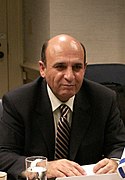Kadima leadership election, 2008
|
|
|||||||||||||||||||||||||||||||||||
|---|---|---|---|---|---|---|---|---|---|---|---|---|---|---|---|---|---|---|---|---|---|---|---|---|---|---|---|---|---|---|---|---|---|---|---|
|
|||||||||||||||||||||||||||||||||||
|
|||||||||||||||||||||||||||||||||||
|
|||||||||||||||||||||||||||||||||||
An election for the leadership of Kadima was held on 17 September 2008 as a concession to Kadima's coalition partner, Labour, which had threatened to bring down the government if Prime Minister Ehud Olmert didn't stand aside following police investigations into alleged corruption during his terms as minister and as mayor of Jerusalem.
As Kadima remained the largest party in the Knesset and the coalition, Foreign Minister Tzipi Livni, the designated new leader after balloting, had the chance to form a government without a need for elections.
The two front-runners throughout the campaign consistently remained Mofaz and Livni, with Livni always holding a consistent lead in the polls. (Although, it should be noted, Israeli primary polls are frequently unreliable, due to poor sampling and turnout predictions. Most of the polls in the 2012 Kadima primary showed Livni ahead of Mofaz, yet Mofaz ended up winning by 24 points; likewise, Amir Peretz beat former Prime Minister Shimon Peres in the 2005 Labor leadership primary even though most polls predicted a solid Peres victory.) While both frontrunners supported a two-state solution, Mofaz attacked Livni for wanting to divide Jerusalem in a final peace deal with the Palestinians, and claimed that his military experience would make him a more qualified Prime Minister. Livni and her supporters claimed that a vote for Mofaz is the same as a vote for the Likud due to Mofaz's hawkish and more right-wing positions. They emphasized Livni's "clean" (free from corruption allegations) image and showed that Kadima led by Livni would win more seats in Parliament than Kadima led by Mofaz. Outgoing Prime Minister Ehud Olmert remained neutral in the primary, but was alleged to privately favor Mofaz.
...
Wikipedia




